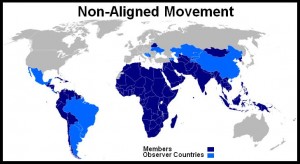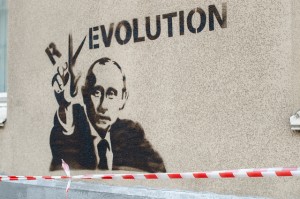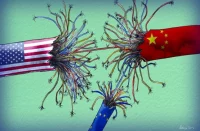Please read “Modi’s Game And The True Meaning Of Multipolarity” beforehand for context.
After having explored India’s close ties with both Russia and the US, the two primary rivals in the ‘New Cold War’, one may be left wondering how the country can balance between them. After how, how can Modi rectify the seemingly contradictory statements of Russia being “India’s best friend” while his country works in league with the US “toward shaping the character of this century”? The crux of the matter lies in a major misperception that many people have about India’s international role, in that it is assumed that all BRICS countries are R&D states and not simply multipolar. Put another way, there is a widespread and inaccurate belief that the BRICS are united in completely opposing the unipolar world, but being a multipolar state (as India is) doesn’t necessarily demand such ideological rigidity, for better or for worse.
Let’s briefly look at a more accurate description of multipolar and R&D states in order to better understand the game Modi is playing:
Multipolar States:
 These countries can be said to comprise the majority of the world’s states and closely correspond to the Non-Aligned Movement. They believe in a fairer distribution of global power (be it economic, military, political, cultural, etc.) away from the West and towards the Rest, and they feel that the future that the unipolar world has provided them with after the Cold War didn’t meet their expectations and was to their overall disadvantage. Seeking to level the playing field, they partake in various activities (to various degrees) that attempt to construct alternative institutions and structures that can compete with the unipolarity. All of this is performed so that the multipolar state can gain a relative advantage in its respective region in order to better compete with its neighbors and similarly sized rival powers. Their key characteristic is they have no qualms about working within the unipolar system or with its associated states in order to achieve this, which puts them at odds with their R&D counterparts.
These countries can be said to comprise the majority of the world’s states and closely correspond to the Non-Aligned Movement. They believe in a fairer distribution of global power (be it economic, military, political, cultural, etc.) away from the West and towards the Rest, and they feel that the future that the unipolar world has provided them with after the Cold War didn’t meet their expectations and was to their overall disadvantage. Seeking to level the playing field, they partake in various activities (to various degrees) that attempt to construct alternative institutions and structures that can compete with the unipolarity. All of this is performed so that the multipolar state can gain a relative advantage in its respective region in order to better compete with its neighbors and similarly sized rival powers. Their key characteristic is they have no qualms about working within the unipolar system or with its associated states in order to achieve this, which puts them at odds with their R&D counterparts.
R&D States:
By their very description, the R&D states are dedicated to resisting and defying unipolarity in all ways, some more successful (and for the time, realistic) than others. Although they may still have some links with unipolarity (either through cultural colonization [Russia] or prior economic links that catapulted them to power [China]), their end game is to eventually shed their dependencies and attain as much individual sovereignty as possible, be it for their state, economic grouping, or civilization. They understand that there is undoubtedly a unipolar legacy existing within their power structures that cannot be immediately removed (e.g. Russia as a resource supplier to the EU, China as a factory for the West), but they will not allow this in being used as a lever for forcing their submission. When faced with unipolar pushback to their R&D policies (such as the Western sanctions against Russia), they hold steady and firm, intending to weather the storm and understanding that this ‘punishment’ is only an acknowledgement that they have been successful in advancing part of their R&D agenda. Unlike purely multipolar states, the R&D ones will never ‘sell out’ to their unipolar foes in order to promote their regional interests, since their end ambitions are to see a global transformation that posits the wholesome removal of unipolarity from the face of the earth.
A simple set of axioms can help to simplify the difference:
 Axiom:
Axiom:
All R&D states are multipolar but not all multipolar states are R&D. R&D states will never ‘sell out’ to the unipolar world, but multipolar states may do so or at least give the impression of it. Strong multipolar states run the risk of becoming Lead From Behind proxies, but no such threat exists for R&D ones. It is possible for multipolar states to become R&D, but when formerly R&D states backtrack into simple multipolarity (Libya, Cuba), it may portend a future geopolitical disaster.
Examples And Explanations:
It’s necessary to make a brief listing of multipolar and R&D states so that one can more fully grasp which countries they entail:
Multipolar:
Vietnam/India/Turkey/Egypt
R&D:
Russia/China/Iran/Syria/Venezuela/North Korea/Zimbabwe
As is seen, the multipolar states have close and voluntary connections with unipolarity, although they also have made considerable forays into multipolarity and strengthening their relations with some R&D states. Vietnam is the multipolar kingpin in that it most elegantly balances between all sides, although that is not to say that it is completely impartial. Hanoi has been drifting towards the unipolar world lately as of its recent island disputes with Beijing, but it has also moved closer to Russia and India, R&D and multipolar states respectively. India has been the focus of this article and shouldn’t require further explanation about its policies, but Turkey and Egypt may be surprises for some. Both countries have been tied to unipolarity for decades, but only lately have they began their meanderings with multipolarity. Turkey was spurred on by the US using Kurdish nationalism as a tool for pressuring it to invade Syria, while Egypt’s al-Sisi understood very well that treachery that comes with being an American proxy state after having seen Washington promote the terroristic Muslim Brotherhood at his nation’s secular expense.

The R&D states, on the other hand, are unambiguous in their opposition to the unipolar world, and they don’t balance themselves between it and the multipolar one. Russia, China, and Iran are the strongest examples of this, and none of them can realistically be accused of ‘selling out’ their principles. Syria is experiencing first-hand the type of reprisals that the unipolar world carries out against those who resist it, yet the country’s people are so firm in their defiance that they’ve been able to hold out for four long years of externally driven terrorist warfare. It is therefore expected that all other true R&D states would also hold out in the event of equal or stronger pressure, to say nothing of lesser and relatively more mild means of reining them in (e.g. Color Revolutions, sanctions). When deciding whether to designate a state as multipolar or R&D, it is thus necessary to ask oneself whether the country in question would behave like Syria if exposed to the same type of onslaught and fight to the death to defend its sovereignty and beliefs, or if it would simply capitulate and allow itself to be overrun by the terrorist hordes.
Concluding Thoughts
Although one may have skeptically questioned whether India’s intimate interactions with the US and Israel make it possible to still designate it as a multipolar state at all, they likely didn’t have a full understanding of what exactly such a state is or how it typically behaves. More than likely, they had their perceptions of both India and multipolar states in general confused with R&D ones, which is actually quite a common mistake among those that support the global transition away from unipolarity. Nonetheless, the difference is critically important in order to grasp the complicated political processes unfolding before the world today. The contrast between a multipolar and a R&D state may appear slight at first glance, but in practice, the gulf is widened as each actor’s relationship with the unipolar world (the key variable) is taken into account. This is why India may appear to be a sell-out for some (the R&D supporters) but a pragmatic state for others (the multipolar supporters). Those that accept India’s moves towards the US and Israel as being in its own interests are actually advocates of multipolarity, favoring a more liberal stance vis-à-vis the unipolar world, while those that criticize such steps are on the side of the R&D states and take a more conservative approach in the fight against unipolarity.














Pingback: Modi’s game and the true meaning of multipolarity | Oriental Review
Pingback: Separating the Multipolar from the R&D States-Multipolarity
Pingback: Putin And The Mideast’s Middleman. Egypt’s Strategic Game | newsgrubber
Pingback: Putin And The Mideast’s Middleman: Egypt’s Strategic Game | EMerging Equity
Pingback: Vatican clergy and Ukrainian nationalism (II) | Oriental Review
Pingback: Vatican clergy and Ukrainian nationalism (II)
Pingback: Pope Francis Is The World’s Most Influential Agent Of Ukrainian Nationalism | The Vineyard of the Saker
Pingback: Exceptionalists vs Integrationalists: The Eurasian-Wide Struggle | The Vineyard of the Saker
Pingback: The Eurasian-Wide Struggle Against the American-Led Cerberus | Timber Exec
Pingback: How the Pentagon plans to defeat Eurasia and roll out Robotic Warfare (I) | Oriental Review
Pingback: How the US Plans to Defeat Eurasia « National Vanguard
Pingback: Robotic Warfare Part of Pentagon Strategy to Defeat Eurasia – Andrew Korybko | Timber Exec
Pingback: How the Pentagon Plans to Defeat Eurasia and Roll out “Robotic Warfare” | SHOAH
Pingback: Jak Pentagon plánuje porazit Eurasii a rozjet „robotické válčení“ | ALMANACH
Pingback: Polar Reorientation In the Mideast (US-Iran)? (I) | Oriental Review
Pingback: “The New Middle East”: Russian Style (I) | Oriental Review
Pingback: “The New Middle East” : Russian Style | Uprootedpalestinians's Blog
Pingback: Russia’s military action first step towards revision of international relations, to replace US in the Middle East |
Pingback: Is Southern Africa About To Be Shaken Up By Hybrid War? (I) | Oriental Review
Pingback: Color Revolutions? Is Southern Africa About To Be Shaken Up By Hybrid War? | Counter Information
Pingback: Oriental Review : Is Southern Africa About To Be Shaken Up By Hybrid War? (I) | documentation.erlande
Pingback: Vatican Clergy And Ukrainian Nationalism | The GLOBAL POLITICS
Pingback: Hybrid Wars 8. Is Southern Africa About To Be Shaken Up? | Oriental Review
Pingback: Hybrid Wars: Is Southern Africa about to Be Shaken Up? | Fake News Registry
Pingback: Guerre Hybride 8. L’Afrique australe est-elle sur le point d’être secouée ? | Réseau International